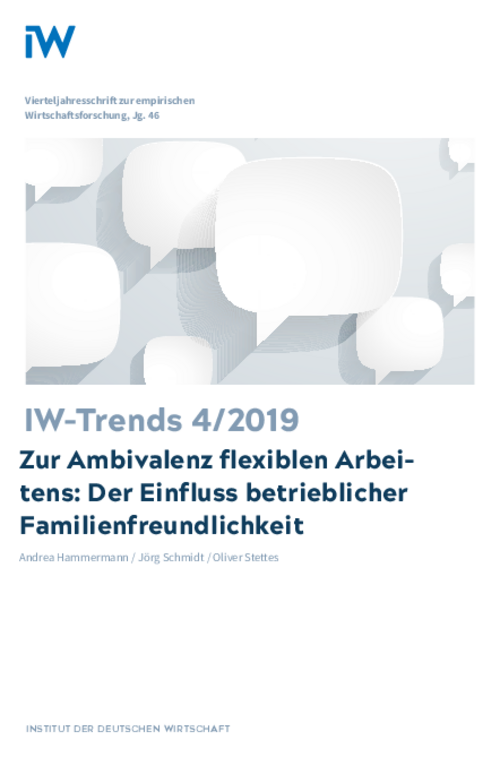Family-Friendliness New developments in technology are making it easier for companies to be flexible about when and where their staff work. However, a recent survey of companies and employees conducted as part of the Corporate Family-Friendliness Monitor 2019 (Unternehmensmonitor Familienfreundlichkeit 2019) shows that the relationship between mobile working and how the compatibility of family and career is actually experienced can be ambivalent.

On the Ambivalence of Flexible Working: The Influence of Corporate
IW-Trends

Family-Friendliness New developments in technology are making it easier for companies to be flexible about when and where their staff work. However, a recent survey of companies and employees conducted as part of the Corporate Family-Friendliness Monitor 2019 (Unternehmensmonitor Familienfreundlichkeit 2019) shows that the relationship between mobile working and how the compatibility of family and career is actually experienced can be ambivalent.
Almost nine out of ten employees say their working hours can be reconciled well or very well with family and social obligations outside the workplace. While mobile workers are particularly likely to be satisfied, they are also afraid of missing out on the more interesting tasks if they make extensive use of family-friendly working conditions and consider it important for their careers to be available to their companies outside working hours. This is where a family-friendly corporate culture has a contribution to make by limiting the drawbacks and enhancing the benefits of flexible working for employees. Extensively digitalised enterprises are more often characterised by a corporate culture perceived as family-friendly. Through the targeted use of HR policy instruments such as results-based management companies can ensure that flexible work organisation is also family-friendly

Andrea Hammermann / Jörg Schmidt / Oliver Stettes: Zur Ambivalenz flexiblen Arbeitens – Der Einfluss betrieblicher Familienfreundlichkeit
IW-Trends

More on the topic

Leadership in transformation: Megatrends and management as a driver of change
Leadership dynamics in companies are subject to constant change in order to meet the challenges of their time. Today, the greatest influences result from developments such as demographic change, globalization, individualization, structural change and ...
IW
Orphaned executive chairs in German companies
In 2023, half of the companies in Germany reported increasing problems in filling vacancies for management positions because employees are not aiming for a career. Larger companies are less affected than small companies.
IW